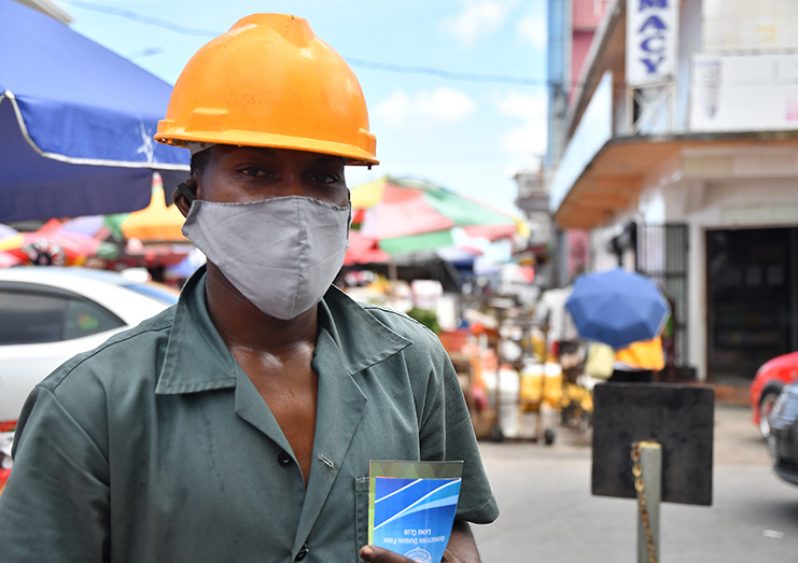By Naomi Parris
WHILE it has been acknowledged that the COVID-19 pandemic has been hard for everyone, it is particularly difficult for persons who are living with a chronic disease, especially those who are diabetic.
Over the past few months, many calls have been made by health officials for persons who have been diagnosed with a chronic illness or an underlying condition to take extra measures to safeguard themselves from contracting the coronavirus, given the fact that they are more at risk of dying.
Twenty-two-year old, Salome Do Santos has been living with Type One diabetes for the past seven years and while she has managed to keep her diabetes under control, navigating through the coronavirus pandemic has been a struggle for her and a strain on her mental health.
The young woman during an interview with the Guyana Chronicle, said: “I’ve been indoors and trying my best to take the necessary precautions to avoid contracting any symptoms of COVID-19, since I have an underlying condition. I’ve been testing more than usual now because of fear,” Do Santos said, adding, “honestly sometimes it’s overwhelming because of the fear of contracting the virus.”
Meanwhile, Shawn Stephens, who was recently diagnosed with diabetes, noted that he has been taking extra precautionary measures on a daily basis, especially on the days when he has to go to work.
The young man noted that he is always clad in his mask and armed with his hand sanitiser. Stephens has also made some changes to his diet and has been using the traditional ‘bush tea’ to limit his risk of contracting the coronavirus.
“I’ve been drinking fever grass or what they call it now, ‘the COVID-19 bush.’ I’ve been using that like regularly every morning. And in my food, I’ve been using a lot of ginger and a lot of garlic as well in order to fight off the bacteria,” he said adding, “I’m just trying to protect myself at all cost, taking all the precautionary measures, using my hand sanitiser and wearing my mask.”
The 24-year-old was diagnosed with diabetes three years ago. Stephens admitted that he was narrow-minded about his illness, as he was of the belief that chronic illnesses such as diabetes affected only older folk.
In sharing advice to persons who may think like he once did, Stephens said: “Don’t take everything for granted in life because it can happen to anyone at any point of time, because sickness doesn’t tell you when it’s coming, it just appears.”
A NEW APPROACH TO DIABETES

According to the Pan American Health Organization (PAHO), Guyana with a population of about 750,000, has an estimated diabetes prevalence of 11%, which is above the average of other South American countries and similar to the high levels in the Caribbean.
Cognisant of this, Minister of Health Dr. Frank Anthony noted that Guyana is in need of a new approach to curb the disease.
“We have to put stronger programmes in place to ensure that [persons] are diagnosed earlier and that we can bring their diabetes under control,” Dr Anthony told this newspaper during a recent interview.
He explained that education will also need to play a critical role in revamping the country’s approach to the chronic disease.
“We also have to complement such a programme with a strong education component, so that everybody involved can be educated about diabetes and how to prevent it, and if you actually get it then what are the steps you need to take to avoid the effects of complication,” the Health Minister said.
DIABETES AND THE CORONAVIRUS
Dr Anthony acknowledged that some of Guyana’s COVID-19 deaths included persons who were diabetic, noting the risk involved for persons with comorbidities.
He advised that vulnerable persons who may have chronic diseases such as diabetes, first need to control their condition by doing regular checkups with their doctors and taking their prescribed medications.
“Also controlling their underlining conditions, if they have diabetes they have to keep their diabetes under control and that is one of the best methods of guarding against COVID, because if you can control your underlying condition you will be able to reduce your risk.
“Secondly, these group of people need to take extra-precaution in terms of their social distancing. They should try as much as possible to isolate themselves and keep their distance away from people.”
Minister Anthony also advised that persons who are vulnerable to the coronavirus should remain confined to their homes and leave only if it is absolutely necessary.
“If you don’t have essential business, then stay home; if you are not working, stay home; if you need to go out, then take all the precautions you can take to prevent transition [sic].”




.png)









